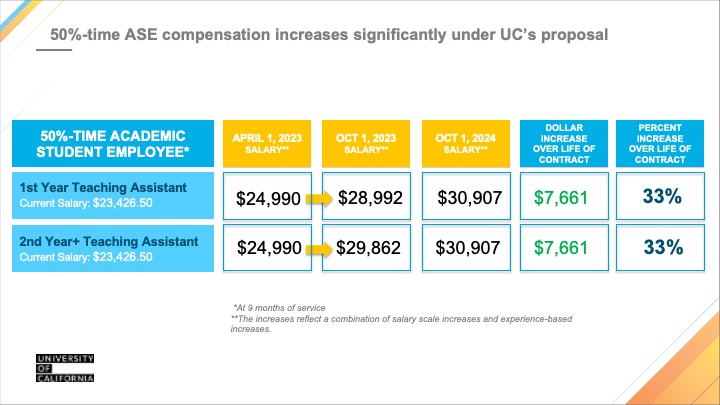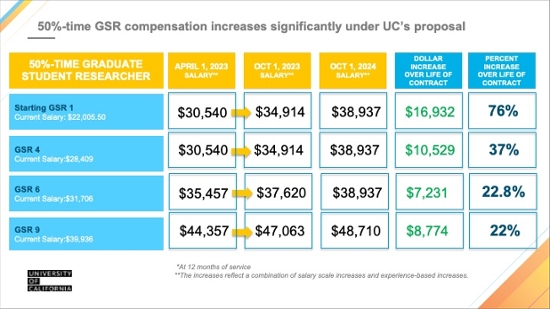Bargaining Update for ASEs and GSRs
Share This Article
As you know, UC is currently in contract negotiations with the United Auto Workers (UAW) on new contracts for UC Graduate Student Researchers (GSRs) and Academic Student Employees (ASEs).
The University has made what it believes are very generous offers — offers that not only recognize the vital role you and your colleagues play at UC but also respond to union and bargaining unit members’ priorities, such as wages, transportation, respectful work environment, and support for families. It is our goal to get to resolution as quickly as possible to ensure that you and your colleagues are supported in your professional and academic pursuits.
UC recently presented the UAW with a comprehensive package proposal to reach a Tentative Agreement and complete bargaining, and it is critically important that you know the offer on the table.
UC’s wage proposals effectively provide that by Oct. 1, 2024, total compensation (base salary, campus fees, and childcare reimbursement) — for 50%-time employment — would range from $46,757 to $74,798 (depending on the bargaining unit title and campus), not including the value of paid leaves, transit benefits, and health benefits.
This includes UC covering 100% of campus fees for eligible ASEs/GSRs and amounts to $13,707 to $22,248, depending on the campus.
Here is what our proposals would mean for members of each bargaining unit:
Academic Student Employees (ASEs)
- All ASEs would see pay increases, with Teaching Assistants (67% of the bargaining unit) seeing an average 3-year salary increase of 26%, not including annual experience-based increases.
- By fall 2024, new base salaries for 50%-time employment would range from $29,000 to $36,000.
- The chart below provides specific examples of how UC’s proposal would impact Teaching Assistants paid at the current TA rate:

Graduate Student Researchers (GSRs)
- GSRs on the bottom two points of the current salary scale would see total 3-year salary increases of 41 – 52%, not including experience-based increases.
- 83% of bargaining unit members would see an average 3-year salary increase of 26%, not including experience-based increases.
- By fall 2024, new base salaries for 50%-time employment would range from $33,500 to $48,500.
- The chart below provides specific examples of how UC’s proposal would impact GSRs paid at various current GSR rates:

In addition, UC has proposed the following additional financial support and benefits:
- Paid leave:
- Eight weeks per year for medical, family care, or childbirth-related needs;
- Short-term paid leave of 2 days for quarter campuses and three days for semester campuses;
- Five days of paid bereavement
- Childcare costs reimbursement: UC’s offer increases the childcare reimbursement to $1,350/quarter or $2,025/semester and includes $1,350 for ASEs or GSRs who work in the summer. This represents a 22% percent increase over what campuses currently provide.
- Reasonable Accommodation:
- Confirms reasonable accommodations for those with disabilities and access needs and provides temporary work adjustments for bargaining unit members during the interactive process
- The University will outline the accommodation process in the appointment letter
- Establishes a Joint Labor-Management Committee to address workplace accessibility
- Respectful work environment: The University and UAW jointly commit to promoting and maintaining a work environment in which every employee of the University community is treated with respect, is free from abusive conduct and is provided a method to investigate and resolve disputes.
- Parking and Transit:
Within 12 months of ratification:- Access to a UC-negotiated e-bike purchase discount program, minimally at 15%, with the goal of 20%
- Access to pre-tax accounts for parking and transit funds and UC will double-match bargaining unit members’ contributions up to $30
- Bargaining unit access to enhanced UC Travel measures to reduce the impact of university business travel on carbon emissions, including more accurate carbon impact estimates of travel itineraries and access to discounted electric vehicle rentals
- Within 36 months: Best efforts by UC to negotiate reduced-fee or no-fee access to the appropriate regional transit system(s) for each location
- Benefits: Continued access to quality health insurance, with full remission of monthly premiums for eligible employees
UC proposes mediation to help facilitate agreements
UC and the UAW have been negotiating regularly for the past several weeks. Progress has been made, and tentative agreements have been reached on several important topics. At the same time, since significant differences remain UC has proposed that UC and the UAW enter into mediation with a neutral, private mediator to help resolve the remaining differences.
Collaboration and compromise help yield good agreements
In the last year, UC has settled contracts with unions representing UC lecturers, nurses, police and clerical, and other administrative staff. These agreements were the result of both sides working collaboratively to find solutions and demonstrating flexibility and a genuine willingness to compromise at the bargaining table. UC has approached the negotiations with UAW in the same fashion.
UC remains committed to negotiating in good faith to reach an agreement as soon as possible, and we will keep you updated on our progress.
As always, thank you for your many contributions to our research mission and the UC community.
